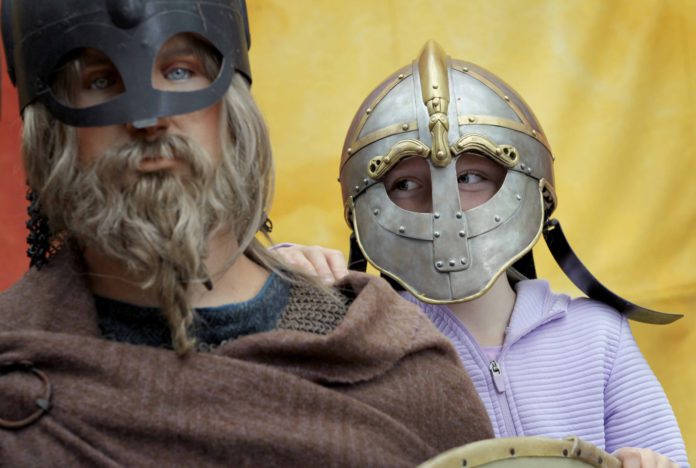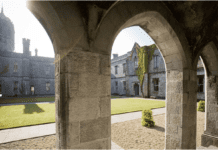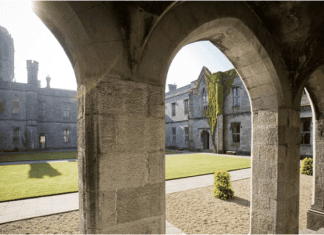
History lovers in Galway have been invited to tune into the crowning weekend of Dublin Festival of History, with events featuring leading Irish and UK writer-historians being live-streamed from The Printworks, Dublin Castle.
Now in its ninth year, Dublin Festival of History is organised by Dublin City Libraries in partnership with Dublin City Council Culture Company.
The are the big themes of the climactic weekend of the festival are gendered violence against women during the War of Independence, LGBTQ+ and Ireland’s public history, the Protestant community in the North today, and family conflict over land.
Events being live-streamed and available to watch live online
- Northern Protestants – On Shifting Ground: Susan McKay in Conversation with Martin Doyle, 9 October, 10.30-11.30am, The Printworks, Dublin Castle, in-person and live-streamed.
Twenty years on from her critically acclaimed book, ‘Northern Protestants: An Unsettled People’, Susan McKay talked again to the Protestant community in Northern Ireland for her latest book, which she will be discussing with The Irish Times Books Editor Martin Doyle.
It contains interviews with politicians, former paramilitaries, victims and survivors, businesspeople, religious leaders, community workers, young people, writers and others.
It tackles controversial issues, such as Brexit, paramilitary violence, the border, the legacy of the Troubles, same-sex marriage and abortion, RHI, and the possibility of a United Ireland, and explores social justice issues and campaigns, particularly the struggle for LGBTQ+ rights.
Susan McKay is an award-winning writer and commentator and contributes regularly to print and broadcast media, including Guardian/Observer, New York Times, The Irish Times and London Review of Books.
- Four Killings – Land, Hunger, Murder & Family in the Irish Revolution: Myles Dungan in Conversation with Catriona Crowe, 9th October, 1.30-2.30pm, The Printworks, Dublin Castle, in-person and live-streamed
Myles Dungan’s family was involved in four violent deaths between 1915 and 1922. His latest book, focused on one family, offers an original perspective on this still controversial period: a prism through which the moral and personal costs of violence, and the elemental conflict over land, come alive.
Jack Clinton, an immigrant small farmer from County Meath, was murdered in the remote and lawless Arizona territory by a powerful rancher’s hired assassin; three more died in Ireland, and each death is compellingly reconstructed in this extraordinary book.
Mark Clinton was murdered by a group of agrarian ‘bandits’ who resented his family’s possession of some disputed acres; his killer was tried and executed by the dead man’s relatives and comrades in the Meath IRA.
A youth with an intellectual disability was shot as an informer by another relative of Dungan’s and buried in secrecy and silence. Hear Myles Dungan in conversation about the subject of his book with Catriona Crowe, one of Ireland’s leading historians and commentators, elected to the Royal Irish Academy in 2012.
Myles Dungan is an Irish broadcaster and author. He has presented many arts programmes on RTÉ radio, and has also been a sports broadcaster on RTÉ television. Since October 2010 he has been the presenter of “The History Show” on RTÉ Radio One.
- Between Two Hells: The Irish Civil War – Diarmaid Ferriter in Conversation with Ronan McGreevy, 9th October, 4.30-5.30pm, The Printworks, Dublin Castle, in-person and live-streamed
At the end of the Irish War of Independence, Dublin signed an unsatisfactory treaty with London that amongst other things, required oaths of allegiance to the British Empire. To many this was a price worth paying, but for others it was impossible. Very quickly, in 1922 the country collapsed into a cruel civil war that split organisations like Sinn Fein and the IRA, local communities, and families.
It was less devastating than some other European civil wars, but it left a ghastly number of dead, injured and immiserated across Ireland, north and south. And it cast a long shadow across Ireland. Fine Gael and Fianna Fail, the two parties that grew out of the rival factions, have ruled Ireland since the end of the civil war.
It was only in 2019 – almost a century after the conflict – because of Sinn Fein’s electoral success that the two parties could see their way to officially working together.
Drawing on completely new sources, Ireland’s most brilliant historian will be discussing how important this tragic war was for understanding Ireland now in a conversation with The Irish Times news reporter Ronan McGreevy.
Diarmaid Ferriter has been Professor of Modern Irish History at UCD since 2008. He is a weekly columnist for The Irish Times and in March 2019, was elected a member of the Royal Irish Academy.
- The Irish Assassins – Conspiracy, Revenge and the Murders that Stunned an Empire: Julie Kavanagh in Conversation with Roy Foster, 9th October, 7.30-8.30pm, The Printworks, Dublin Castle, in-person and live-streamed
On a sunlit evening in l882, Lord Frederick Cavendish and Thomas Burke, Chief Secretary and Undersecretary for Ireland, were ambushed and stabbed to death while strolling through Phoenix Park in Dublin. The murders were carried out by the Invincibles, a militant faction of republicans armed with specially-made surgeon’s blades. They ended what should have been a turning point in Anglo-Irish relations.
A new spirit of goodwill had been burgeoning between Prime Minister William Gladstone and Ireland’s leader Charles Stewart Parnell, with both men forging in secret a pact to achieve peace and independence in Ireland – with the newly appointed Cavendish, Gladstone’s protégé, to play an instrumental role.
The impact of the Phoenix Park murders was so cataclysmic that it destroyed the pact, almost brought down the government and set in motion repercussions that would last long into the twentieth century.
Julie Kavanagh will be discussing the subject of her latest book in a conversation with distinguished Irish historian and academic Roy Foster.
Julie Kavanagh is a renowned journalist, former New Yorker London editor, former arts editor of Harpers & Queen and Costa Biography Award finalist.
Across the island of Ireland, much work has been done to collect and share the stories of LGBTQ+ lives. This panel discussion brings together practitioners who have worked on LGBTQ+ in public history to discuss their work – from grassroots projects to archives and museums.
The panel comprises: Chairperson Sara R Philips, a trans activist working globally and Chair of the Board of Directors of Transgender Equality Network Ireland (TENI); Dr Richard O’Leary, a Visiting Scholar in History at Queen’s University Belfast and professional storyteller, whose latest solo show is provisionally titled ‘My Queer History of Northern Ireland’; Dr Maurice J Casey, Historian in Residence at EPIC The Irish Emigration Museum, where he is the curator of current exhibition Out in the World: Ireland’s LGBTQ+ Diaspora, and the Irish Department of Foreign Affairs; Kate Drinane, member of the Education Team at the National Gallery of Ireland, where she introduced and developed LGBTQIA+ programming, and founder of the Queer Culture Ireland.
- If Ever You Go To Dublin Town: Donal Fallon in conversation with Nicola Pierce and Kathryn Milligan, Sunday, 10th October, 11.00am-12.00pm, The Printworks, Dublin Castle, in-person and live-streamed
Come Here To Me blog co-founder Donal Fallon will be in conversation with two writers who have written recent books on the history of Dublin. In O’Connell Street: The History and Life of Dublin’s Iconic Street, Nicola Pierce explores the people, the history, the buildings and the stories behind the main street in our capital.
Kathryn Milligan’s Painting Dublin, 1886-1949: Visualising a Changing City represents the first detailed study of the depiction of Dublin in nineteenth- and twentieth-century art. Milligan demonstrates the important role played by the portrayal and experience of urban life; a role shaped by huge historical, political, and social change.
Dr Mary McAuliffe looks at Republican acts of surveillance and gendered violence against women, including forcible haircutting and other sexualised assaults, threatening letters, battery and abductions during the War of Independence. Using her research in multiple archives, she will analyse the specific types of violence and intimidation experienced by civilian women during this period, their impacts and legacies, as well as the long historical silence about this.
Dr Mary McAuliffe is a historian and Director of the Gender Studies Programme at UCD, specialising in Irish women’s / gender history.
- George III – The Life and Reign of Britain’s Most Misunderstood Monarch: Andrew Roberts in Conversation with Lisa Marie Griffith, Sunday, 10th October, 7.30-8.30pm, live-streamed only
George III, Britain’s longest-reigning king, has gone down in history as ‘the cruellest tyrant of this age’. Andrew Roberts’s new biography takes entirely the opposite view. It portrays George as intelligent, benevolent, scrupulously devoted to the constitution of his country and (as head of government as well as head of state) navigating the turbulence of eighteenth-century politics with a strong sense of honour and duty.
He was a devoted husband and family man, a great patron of the arts and sciences, keen to advance Britain’s agricultural capacity (‘Farmer George’) and determined that her horizons should be global.
He could be stubborn and self-righteous, but he was also brave, brushing aside numerous assassination attempts, galvanising his ministers and generals at moments of crisis and stoical in the face of his descent – five times during his life – into a horrifying loss of mind. Hear Andrew Roberts in conversation about the subject of his latest book with Irish author and historian Lisa Marie Griffith.
Andrew Roberts is a biographer and historian of international renown. He is currently Visiting Professor at the Department of War Studies at King’s College, London, and the Roger and Martha Mertz Visiting Research Fellow at the Hoover Institution at Stanford University.
All Dublin Festival of History ‘Big Weekend’ events are free, but booking is required for both in-person and live-stream audiences. The full programme details, along with information about how to book is available online at www.dublinfestivalofhistory.ie.










